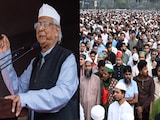In recent years, Russia has arrested at least a dozen scientists and physicists on suspicion of high treason. According to the BBC, three out of a dozen have already died in custody but the mystery remains.
Last month, elderly Russian physicist Anatoly Maslov was sentenced to 14 years in a penal colony for treason, the latest of a string of cases against experts working on the science that underpins Russia's development of hypersonic missiles.
In April, renowned Russian scientist Alexander Kuranov received a seven-year sentence in a high-security prison for state treason. The director of the Khristianovich Institute of Theoretical and Applied Mechanics (ITAM) in Novosibirsk Siberia, Alexander Shiplyuk was also arrested in August 2022.
All these scientists had conducted theoretical work in areas relevant to the development of hypersonic missiles - cutting-edge weapons capable of carrying payloads at up to 10 times the speed of sound to punch through air defence systems.
Lawyer Yevgeny Smirnov of Pervy Otdel (First Department), an association that specialises in defending people in cases of treason and espionage, said the charges against the three scientists were approximately the same - spilling information considered a state secret while participating in an international conference or research.
While the Kremlin called the accusations ''serious'', colleagues and defence lawyers said the scientists weren't involved in weapons development. In an open letter, they decried their arrests, saying that the three men had merely participated in overseas conferences and international projects and that they had their work published in popular magazines. The letter also said they were known for ''brilliant scientific results" and had ''always remained faithful'' to their country's interests.
Scientists are still expected to publish internationally and collaborate with foreign colleagues, "meanwhile, the FSB thinks contact with foreign scientists and writing for foreign journals is a betrayal of the Motherland", the arrested scientists' colleagues said.
''We just don't understand how to continue doing our job. What we are rewarded for today… tomorrow becomes the reason for criminal prosecution,'' their open letter said.
Yevgeny Smirnov, a lawyer with First Division, a Russian human rights and legal organisation, said that, in private conversations, FSB officers have admitted to him that cases about sharing hypersonic secrets were being opened "to satisfy the wishes of those higher up".
He believes the FSB wants to give the impression that spies are hunting Russian missile secrets "to flatter the ego" of Mr Putin. Mr Smirnov added that the FSB sometimes offers more lenient sentences if suspects confess and implicate others.
As per the Moscow Times, treason cases are heard behind closed doors in Russia as they deal with what authorities deem to be classified information. Those found guilty face a maximum prison sentence of 20 years.















